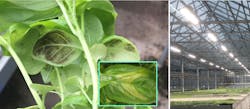It seems like we had a long lead-up to our HortiCann Light + Tech event and then before we knew it, October was here! We are so thankful to have had top-notch speakers and panelists, as well as supportive sponsors helping to deliver this program. And of course we want to acknowledge the hard work of our internal webcast and event operations team. Big virtual high fives, everybody.
Because we have a solid summary on the first day of the HortiCann program and we will be bringing you a full feature on the event in early 2021, I don’t want to get caught up in rehashing much of it here. But the Closing Plenary was an excellent finale to the latest insights on horticultural and AgTech systems, plant science, and the financial/business value this knowledge brings when applied to both new controlled environment agriculture (CEA) ventures and revamped grower facilities.
Related article: Top three trends to note in HortiCann program
- In introduction, Mattos noted that if all horticultural lighting were fitted as LED right now, a 34% energy reduction would be achieved, but as he cited, 98% of existing greenhouse space is still equipped with high-pressure sodium (HPS) and metal halide.
- Paul Sellew, CEO of Little Leaf Farms (Devens, MA), stated that “produce is a not a subsidized agricultural industry”…So payback to operators is more about operational cost reductions and less loss of produce over time. In Massachusetts, he observed, you mainly need supplemental grow lights during the shorter daylight hours of fall and winter.
- Alex Traven, owner and grower at Peace Tree Farm (Kintnersville, PA), found that LED lighting has a positive impact on the beneficial organisms that the organic operation relies upon to help with biological pest control. The beneficial predator insects Orius insidiosus, for example, were drawn to the previous hot HPS lights in the farm’s greenhouse, which of course obliterated some of those desirable bad-bug killers. But the cooler LED lighting does not harm the bugs and so they continue to help keep pests in check.
- Bob Hoffman, chief scientific officer, Shenandoah Growers (headquartered in Rockingham, VA), described some concerns of the neighboring community about light pollution, noting that the grower installed roll-up blackout curtains that eliminate 95% of light escape. However, “after a few death threats” (wait, seriously??) they changed the lighting regimen and the lights are turned off by 10:00 PM to “be good neighbors.”
- Pablo Costa, operational manager at Van Belle Nursery (Abbotsford, BC, Canada), explained that the nursery’s location and lighting for the most part has not bothered local residents. But once there was a mistaken report of a fire due to the blazing red glow from the lights and the evaporation coming off the greenhouse, and a resident called the fire station. The nursery has also changed its lighting schedule to appear less disruptive, but they do not currently have blackout curtains installed.
I found the directed questions to the panelists to provoke excellent discussion and revealed the differences in operations with varying cultivars and growing priorities; however, there was plenty of applicable insight for all growers — and the technology providers who are looking to supply them. Hit up the archived event for this panel and more.
For up-to-the-minute LED and SSL updates, why not follow us on Twitter? You’ll find curated content and commentary, as well as information on industry events, webcasts, and surveys on our LinkedIn Company Page and our Facebook page.

Carrie Meadows | Editor-in-Chief, LEDs Magazine
Carrie Meadows has more than 20 years of experience in the publishing and media industry. She worked with the PennWell Technology Group for more than 17 years, having been part of the editorial staff at Solid State Technology, Microlithography World, Lightwave, Portable Design, CleanRooms, Laser Focus World, and Vision Systems Design before the group was acquired by current parent company Endeavor Business Media.
Meadows has received finalist recognition for LEDs Magazine in the FOLIO Eddie Awards, and has volunteered as a judge on several B2B editorial awards committees. She received a BA in English literature from Saint Anselm College, and earned thesis honors in the college's Geisel Library. Without the patience to sit down and write a book of her own, she has gladly undertaken the role of editor for the writings of friends and family.
Meadows enjoys living in the beautiful but sometimes unpredictable four seasons of the New England region, volunteering with an animal shelter, reading (of course), and walking with friends and extended "dog family" in her spare time.






